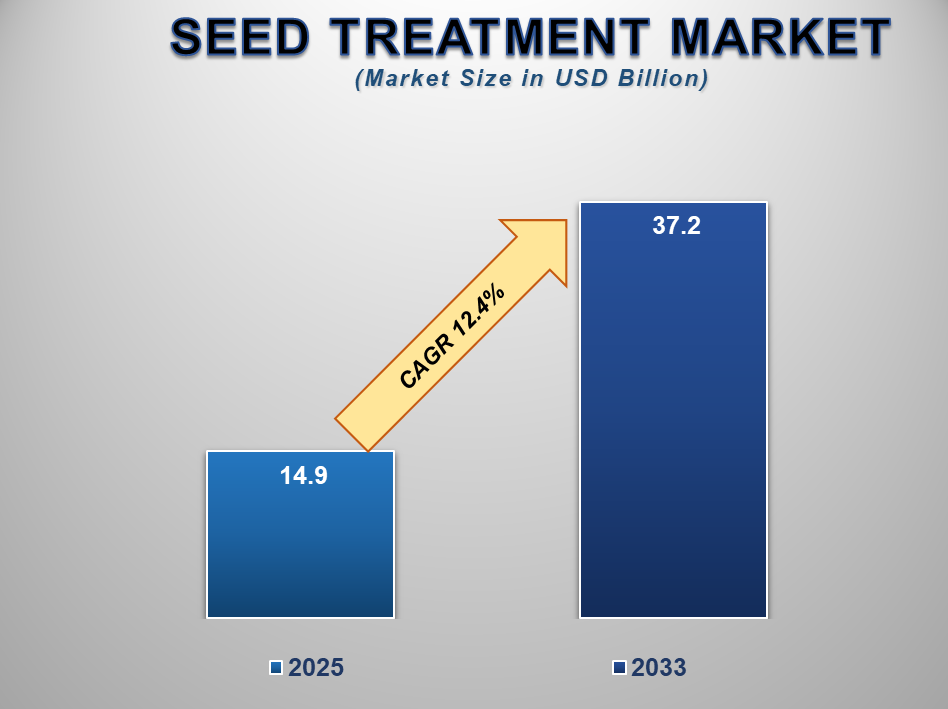Global Seed Treatment Market Growth: Share, Value, Size, Analysis, and Trends

Global Seed Treatment Market Overview
The Global Seed Treatment Market size is witnessing significant growth, driven by increasing concerns over crop protection, rising demand for high-yield seeds, and advancements in formulation technologies. According to market analysis, the Seed Treatment Market is projected to grow from USD 14.9 billion in 2025 to USD 37.2 billion by 2033, expanding at a strong compound annual growth rate (CAGR) of 12.4% during the forecast period.
Get Report Link : https://m2squareconsultancy.com/reports/seed-treatment-market
Seed treatment has quietly become one of agriculture’s most influential value-adds. By coating seeds with pesticides, biologicals, nutrients and protective polymers before planting, growers boost early vigor, reduce crop losses and cut the need for some in-field sprays. As pressures from pests, unpredictable weather and the need to raise yields sustainably intensify, seed treatments are moving from a “nice-to-have” to a core component of modern cropping systems.
Get Sample Report Link https://m2squareconsultancy.com/request-sample/seed-treatment-market
Buy Now Link https://m2squareconsultancy.com/purchase/231
Market snapshot: size and growth
Recent market studies show the global seed treatment market is sizeable and growing. One widely cited forecast puts the market at roughly USD 7.8–9.4 billion in the mid-2020s with projections into the teens by the end of the decade, depending on source and scope. Several analysts expect mid-to-high single-digit CAGRs through 2030, while specialized forecasts for biological seed treatments show much higher growth rates. These differing estimates reflect how analysts treat biologicals, formulation services, and whether “seed technologies” beyond coatings are included.
What’s driving demand?
Four main forces are fueling adoption:
-
Crop protection efficiency — Treating seeds directly protects vulnerable early growth stages from soil and seed-borne diseases and pests, delivering a higher return on protection per hectare than some foliar approaches.
-
Sustainability and input optimization — Growers and regulators are pushing reduced in-field pesticide loads; precise seed treatments help lower total active ingredient use while maintaining protection.
-
Biologicals and formulation innovation — A surge in microbial inoculants, biofungicides and plant-growth promoting formulations is creating a faster-growing subsegment of the market. Biologics are attractive because they can improve soil health and are perceived as more environmentally friendly.
-
Seed industry consolidation and R&D — Large seed and agrochemical companies continue to invest in proprietary seed technologies and application systems, supporting broader commercial rollouts.
Product mix and trends
Historically, chemical fungicides and insecticides dominated seed treatments. Today, the picture is more diversified:
-
Chemical coatings (insecticides, fungicides) still represent the bulk of value by volume in many crops, especially cereals and large-acre row crops.
-
Biological seed treatments are the fastest growing slice — multiple reports peg biological seed treatments as expanding at double-digit CAGRs over the next five years as formulation stability and shelf-life improve.
-
Precision and combination treatments — “stacked” seed treatments combining chemistry, biological actives and micronutrients are rising as companies seek differentiated propositions that boost early stand establishment and yield.
Regional dynamics
North America and Europe remain large and sophisticated markets because of high mechanization, established seed-treatment infrastructure and regulatory oversight. Latin America and Asia-Pacific are critical growth engines: expanding planted area, intensification of cropping systems and rising adoption of treated seeds in staple crops are driving uptake. Market reports point to particularly strong expansion in parts of Asia and Latin America as smallholders and commercial farmers adopt packaged, treated seed as part of modern input programs.
Industry landscape — who’s winning?
The market features a mix of global agrochemical giants, regional formulators and specialist biological firms. Major multinational players — including Bayer, Corteva, Syngenta, BASF and UPL — maintain large portfolios and distribution networks, while smaller biotech companies are carving niches in microbial seed treatments and novel delivery systems. Partnerships, acquisitions and co-development deals are common as incumbents plug biologicals into their offerings.
A recent industry move underlines how companies are optimizing their focus: Bayer announced it would exit manufacturing of certain seed-treatment equipment in the U.S., shifting resources toward core product development while relying on third parties for some machinery needs. That kind of strategic realignment shows the sector is evolving fast — suppliers are concentrating on formulation and active-ingredient innovation, not always equipment manufacture. Reuters
Challenges and headwinds
Seed treatment faces important constraints: regulatory scrutiny over certain chemistries (neonicotinoids remain controversial in many jurisdictions), variability in biological efficacy across soils and climates, and logistical issues like seed storage and coating consistency. For biologicals specifically, formulation stability and consistent field performance are technical hurdles suppliers continue to solve.
What this means for stakeholders
-
Growers: Treated seed can reduce early losses and simplify input programs, but choosing the right treatment requires local testing and sound agronomic advice.
-
Suppliers: Success will hinge on integrating biologicals with robust chemistry, improving formulation shelf life, and offering clear ROI evidence to farmers.
-
Investors: The biological seed treatment subsegment and companies enabling on-farm precision application look attractive for growth-oriented portfolios. Grand View Research+1
Outlook
The global seed treatment market is poised to grow steadily through the end of the decade, with biologicals and smarter combination treatments delivering disproportionate upside. Regulatory shifts and evolving farmer preferences will shape winners and losers, but the underlying drivers — yield pressure, sustainability demands and the economics of early-season protection — make seed treatment a cornerstone of 21st-century crop protection strategies. For anyone in agribusiness, from input suppliers to growers and investors, watching who can reliably deliver safe, stable and effective seed treatments will be essential.
Buy Now Link https://m2squareconsultancy.com/purchase/231
Related Reports Links :
https://m2squareconsultancy.com/reports/sports-sponsorship-market https://m2squareconsultancy.com/reports/air-purifier-market
https://m2squareconsultancy.com/reports/digital-thread-market
https://m2squareconsultancy.com/reports/night-vision-device-market
https://m2squareconsultancy.com/reports/battery-energy-storage-systems-bess-market
https://m2squareconsultancy.com/reports/commercial-printing-market
https://m2squareconsultancy.com/reports/global-rfid-market
https://m2squareconsultancy.com/reports/electrical-steel-market
https://m2squareconsultancy.com/reports/aerogel-market
https://m2squareconsultancy.com/reports/3d-printing-materials-market
https://m2squareconsultancy.com/reports/emi-shielding-market
https://m2squareconsultancy.com/reports/ceramic-tiles-market
https://m2squareconsultancy.com/reports/digital-wound-care-management-systems-market
https://m2squareconsultancy.com/reports/diagnostic-imaging-market
About m2squareconsultancy :
We are a purpose-driven market research and consulting company passionate about turning data into direction. Founded in 2023, we bring together researchers, strategists, and data scientists who believe that intelligence isn’t just about numbers, it’s about insight that sparks progress.
We cater to a wide range of industries by delivering customized solutions, strategic insights, and innovative support that help organizations grow, adapt, and lead in their respective sectors. Here’s a brief overview of key industries we work with
Contact Us:
Email: sales@m2squareconsultancy.com
Phone (IN): +91 80978 74280
Phone (US): +1 929 447 0100
- Art
- Causes
- Crafts
- Dance
- Drinks
- Film
- Fitness
- Food
- Jogos
- Gardening
- Health
- Início
- Literature
- Music
- Networking
- Outro
- Party
- Religion
- Shopping
- Sports
- Theater
- Wellness



